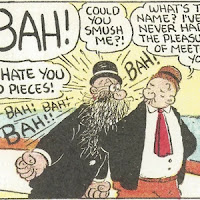Authenticity
A Sermon preached during a
Facebook Live Broadcast: Sirach 26:10
the Rev'd Dr. Elizabeth Kaeton
Note: This is NOT the sermon I preached. When it came time to broadcast, I felt I couldn't preach on authenticity while reading from a manuscript. What I preached has elements of this sermon but it turned out to be much shorter than this.
I try very hard to tell this story only once every three years. I’m afraid I’ve lost track so if you’ve heard me tell it before, well, let me just say that it’s one of my favorite stories so thank you for understanding and I hope you enjoy hearing it again.
So, the story goes that St. Peter decided to take the day off from his official duties of welcoming the newcomers to the Pearly Gates and – what else? – go fishing. Jesus was happy to volunteer to cover for him.
Bright and early the next morning, Jesus appeared at the Gates even before the angels and archangels, the seraphim and cherubim, arrived for their warm up Alleluias. He had put on his special, dazzling-white robe – the one he had worn on Mt. Tabor (or, was it Mt. Hermon?) for the Transfiguration – and his Sunday-go-to-meeting handmade Italian leather sandals.
Suddenly, it was time, and the cherubim giggled as they opened wide the Pearly Gates of Heaven. The first arrival at the gate was a Roman Catholic priest. Jesus gave him a hearty welcome and then said, “Say, I’m wondering if you’d answer a question for me. Who do you say that I am?”
The Roman Catholic priest said, “Well, the Pope says. . . .” Jesus quickly cut him off saying, “I know what the Pope says. I’ve read all the encyclicals of all the Popes. Welcome! Welcome! Come in! Come in! ”
The next arrival was a Lutheran pastor. Jesus also gave him a hearty welcome and then asked him the same question: “Who do you say that I am?”
The Lutheran pastor said, “Well, the Bible says . . . “ Jesus quickly cut him off saying, “I know what the Bible says. I’ve read every bible in every version. Come in! Come in! Welcome! Welcome!”
Finally, an Episcopal priest appeared at the gate. Jesus gave him a warm and enthusiastic welcome and then asked, “Who do you say that I am?”
The Episcopal priest said, “Why, You are the Messiah, the Son of the living God! The Anointed One! The Christ who is and was and is to come!”
Jesus was absolutely elated. He even did the same little joy-joy-happy-happy dance he gave when Peter gave him a very similar answer. “Yes! Yes! Yes,” said Jesus. “That’s absolutely right.”
And then, the Episcopal priest became a bit pensive and thoughtful and said, “Yes, but others say . . . .”
That is one of my favorite stories not only because it presents, in comic, caricature form, the different Christology (or understanding of Christ) from the various branches of religion, but it does so with a certain amount of authenticity which, I think, gives the story its humor.
If nothing else, we Episcopalians can laugh at ourselves.
It is true that Episcopalians, being Anglicans, adhere to a fairly orthodox view of the humanity and divinity of Jesus while still being open, without judgment, to the interpretation of other perspectives of Jesus.
Someone once said that the Anglican Church is “the roomiest room in all of Western Christianity.” I have found that statement to have more than a thread or two of truth. At least, that’s our goal – to be open to catholic, protestant, evangelical and orthodox expressions of faith which maintaining an adherence to the basic tenants of Christianity.
The point is that, whatever one does, it must come from a place of authentic belief. This is so because, as Jesus said to Simon (who he called) Peter, “ . . . whatever you bind on earth will be bound in heaven, and whatever you loose on earth will be loosed in heaven.”
Those particular words of Jesus, more so than many of the other words of his teachings, have always affected me deeply.
Jesus is speaking, of course, of what he has just said to Simon: “And I tell you, you are Peter, and on this rock I will build my church, and the gates of Hades will not prevail against it. I will give you the keys of the kingdom of heaven . . .”
Jesus is making a promise to Simon Peter and, some say, by extension to the other disciples. It’s as if he’s saying, I will build my church on you and you will have the keys to the kingdom – this is my solemn vow.
Think about that for a moment. Jesus is saying something about the nature of a sacred vow. Jesus is also saying that our spiritual lives are not lived in a vacuum. What comes out of our mouths should be at least as carefully considered and what we put into our mouths.
Jesus is saying that heaven and earth are not hermetically sealed apart from one another; that there is an exchange between the two; that promises or vows made on earth are heard and kept in heaven; and that what has been set free on earth is also set free in heaven.
I’d like to think that explains a bit why, in the story I told earlier, the Episcopal priest is hesitant to name his understanding about Jesus as the ONLY way to understand Jesus that has any authenticity or validity.
It’s not just about being “Protestant nice” or “politically correct” or “polite White”. It’s about being confident in your own beliefs without having to be restrictive of the beliefs of others. It takes real emotional and spiritual maturity not to have to be right – especially about God; to be confident enough in what you believe to practice generosity of spirit.
Religious intolerance is part of the reason this country was founded. The Puritans were very narrow in their focus of what they believed about God and who they thought God is and how they wanted to worship God and behave in the world. They fled England to find religious freedom here in this country.
Ironically, Puritans were pretty intolerant of the religious expressions of the Native people – calling them ‘heathens’ – and, in fact everyone else who came to this land who held different beliefs and expressed those beliefs differently.
That intolerance seems to be in our cultural DNA. There are Roman Catholics who can tell you that part of their family story includes harsh treatment and prejudice. Catholics in revolutionary America tended to be wealthy, English speaking, and more focused on private devotions than on public displays of their faith.
Thus the Protestant majority mostly tolerated them. But, by the 1920s, anti-Catholics, including the Ku Klux Klan, believed that Catholicism was incompatible with democracy and that parochial schools encouraged separatism and kept Catholics from becoming loyal Americans.
That attitude lingered for many years. I certainly remember it as a young Roman Catholic child, growing up as part of an immigrant Portuguese family in the mill town of Fall River, MA. I was just a small child but I have a clear memory of the intensity of the conversations about whether or not John F. Kennedy was fit to be President of the United States.
Not only was JFK the youngest man ever to run for POTUS, he was (gasp!) Irish. And even more unthinkable: he was Catholic. His family was built on its faith. His campaign for president was almost crushed by it. People asked 'If a Catholic were in the White House, would that mean the pope would be calling the shots on what went on in the White House?'"
It sounds ridiculous now, doesn’t it? Especially since we have a President in the White House who professes to have been Presbyterian but is now non-denominational evangelical and a First Lady who is a Roman Catholic who attends Episcopal churches and sends their son to an Episcopal school.
We also have a Democratic candidate for POTUS and his wife who are devout Roman Catholics who both publicly support some issues which are in direct conflict with the strong tenants of the Roman Catholic Church. The candidate for VPOTUS grew up a Christian and a Hindu. Her mother was a native of India and her father was a practicing Baptist from Jamaica. She attends a Black Baptist church and her husband, Doug, is (wait for it) . . . . Jewish.
I submit to you that this is much more a picture of religious tolerance than some people are comfortable with. You must believe in THEIR understanding of God and Jesus or you are somehow deficient. Less than. Suspect. Inauthentic. Un-American.
I’ve quoted her before and I’ll quote her again and again. Author Anne Lamott says, “You can be pretty sure you’ve created God in your own image when it turns out that God hates all the same people you do.”
I think the question Jesus asks his disciples is a question with which all Christians must wrestle and answer if their faith is to be authentic.
Who do YOU say that Jesus is? Not what the Bible says. Not what the Pope or the Archbishop of Canterbury says. Who do YOU say that Jesus is. For YOU?
When we get “real” about our faith, our faith evolves and becomes more real, more authentic. Until one day, we too will stand before Jesus and proclaim, “You are the son of the Living God. You are the Messiah!”
And then we’ll look around at all of the wonderful people from different countries and cultures and creeds who are with us in heaven and know that, while their answer may be different from ours, we are all exactly where we belong – home – with the one who created us from love to love to be authentically who we were created to be: Loving children of the God of Love.
Amen.




















